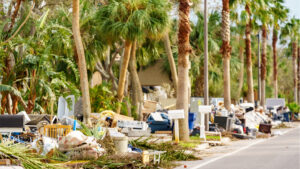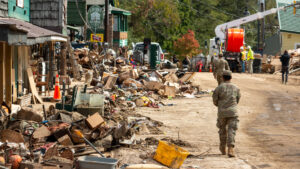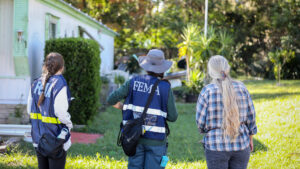This article originally appeared on Inside Climate News, a nonprofit, non-partisan news organization that covers climate, energy and the environment. Sign up for their newsletter here.
By Keerti Gopal, Inside Climate News
The water from Hurricane Milton came up to the door of Erica Hall’s home in St. Petersburg, Florida.
The vicious wind knocked down power lines and dropped trees onto her neighbors’ roofs. She saw cars completely submerged in water throughout the neighborhood but, fortunately, her own waterlogged truck still runs.
Hall lost all the food in her refrigerator after the power failed, she said, but she feels lucky compared to her neighbors.
“A lot of people lost everything,” Hall said. “I’m blessed to not be completely flooded out.”

A member of the Sierra Club’s national board and local Suncoast chapter, and executive director of the local nonprofit Florida Food Policy Council, Hall helped start the “Storm Squad” after Hurricane Elsa three years ago to provide disaster relief to vulnerable, predominantly Black neighborhoods along the coast in south St. Petersburg. In the wake of hurricanes Helene and Milton in September, Hall and her team spent their days checking in on their neighbors, corralling volunteers, mobilizing food trucks to serve free hot meals and coordinating the distribution of essential items like food, diapers, baby formula and cleaning supplies.
In the aftermath of the back-to-back hurricanes, community-led mutual aid networks in the Southeast mobilized for rapid response to their neighbors’ needs, and some climate and environmental organizations pivoted to contribute to or coordinate direct disaster relief.
As disinformation and conspiracy theories fuel distrust of government aid in impacted communities, mutual-aid efforts led by local groups that have already established relationships and trust are sometimes better positioned to reach people in need. But the disinformation is also making it harder for local volunteers to collaborate with the state agencies whose support and resources they need. And the growing frequency of disasters, especially in areas previously considered safe, is prompting local advocates to call for more sustainable solutions.
Some mutual aid providers are speaking out against the politicization of disaster recovery, and advocating for structural changes to increase resources for disaster management in communities now increasingly plagued with recurring devastation, as well as lower the greenhouse gas emissions driving increasingly extreme weather events.
Wanda Mosley, deputy policy director at the Black Voters Matter Fund — a Georgia nonprofit focused on civic engagement that has also engaged in disaster response since Hurricane Michael in 2018 — said that the hurricanes should prompt conversations about government action on climate change.
“We believe that this disaster, this very unfortunate situation, is also a time for us to have real conversations about climate change and how it affects all of us,” she said. “It’s also a time to have conversations about what our government is or is not doing to lessen the harm and the burden.”
Neighbors helping neighbors
The term “mutual aid” describes a horizontal care structure that is an alternative to top-down government aid or charity responses. Community members voluntarily provide resources or services to those in need with the hope that similar aid will be available for them when they need it. Mutual-aid and government responders alike report that grassroots efforts led by people with an intimate understanding of their own community’s needs can often respond more quickly to disasters than government-led programming.
“The fastest response in a disaster is neighbor helping neighbor,” said Craig Fugate, former administrator of the Federal Emergency Management Agency.
“Who knows neighbors better than neighbors?” Hall said.
In the first week after Helene hit, Mosley and her team at the Black Voters Matter Fund delivered supplies to impacted communities every day.
Mosley would load up a U-Haul truck with 60 cases of bottled water, 60 bags of ice, chainsaws, gloves, cleaning supplies, flashlights, batteries, food, diapers, baby formula and other supplies, and drive it from Atlanta to Augusta. The group continued giving away supplies until the Red Cross distribution centers were running the following week, Mosley said.
“Because we aren’t bound to a lot of bureaucracy and red tape, we have the ability to move swiftly and not need a lot of permissions or processes to do things,” Mosely said. “We see ourselves as being able to stand in the gap until the Red Cross, who are the specialists in this type of work, are on the ground and they are fully functional and operational.”

In Western North Carolina, Christy Shi Day and Mark Boyd are among the local residents who started up a public Google document with links to emergency shelters, food and water distribution centers and information on applying for housing assistance, filing insurance claims or applying for aid from FEMA. The document, called the WNC Helene Resource Guide, also maintained information on where to donate or volunteer.
Shi Day, who has a background in trauma-informed disaster response, noted that the psychological trauma of a disaster can reduce people’s capacity to process information, and said that part of the goal for the resource guide is to give people anchors to hold onto.
“One of the things that’s really important about the document…is to create something stable amongst all the chaos,” she said.
In the immediate aftermath of disaster, mutual aid organizers and other volunteers are often working around the clock, without pay. But as recovery shifts into a longer term effort, Shi Day emphasized the need for infrastructure to support community members working together.
As local governments’ public information pages got back online, Shi Day said she and other volunteers have shifted away from live updates to the resource guide and toward efforts for long-term recovery. They are now building a network of individuals who have existing relationships and trust in their communities, and are looking for funding to pay these “trust brokers”—people like hairdressers or dental workers who are well situated to connect people in need to resources—to receive training on trauma management or how money flows in local government. Shi Day said the group is also developing training and orientation materials for non-local aid workers on the social and historical context of Western North Carolina.
“We’re seeing more and more natural disasters and we’re seeing them in areas that we’ve never seen them [in] before,” said Samira Davis, president of the North and South Carolinas chapter of the disaster relief nonprofit United Cajun Navy, which was formed to provide disaster relief in response to Hurricane Katrina in 2005.
Davis is a real estate agent, but her day job has taken a back seat to her role at the nonprofit after Helene, where she averaged about an hour and a half of sleep a night while working in the heavily hit mountains of Western North Carolina immediately after the hurricane.
“What we’re continuing to see is nothing short of catastrophic,” she said. “Winter is coming, and the need is desperate.”
Davis and her team worked to secure warehouses for supply distribution, run coat drives and restore internet access at community centers and faith-based entities where people could convene for support. She spent a day trying to locate insulin for diabetics in Tennessee. Davis said that with the growing frequency of severe storms, the United Cajun Navy is thinking deeply about how to shift from emergency response toward a model for more long-term recovery assistance. But this week, Davis said her work has not slowed down, with community members in Western North Carolina still facing desperate need and struggling to access FEMA aid.
Conspiracy theories and dangerous disinformation
Disinformation and conspiracy theories, such as claims the government can control weather that were buoyed by right-wing voices like Georgia representative Marjorie Taylor Greene, have gone viral on social media. Donald Trump has also repeated false allegations that FEMA relief money was being rerouted to undocumented immigrants.

Despite FEMA’s debunking some persistent hurricane-related rumors, the falsehoods have drummed up outrage in some right-wing circles. In Western North Carolina, volunteers said that conspiracy theories fueled by social media have added to existing distrust of the government in communities that have justifiable frustrations with systems they don’t feel work for them. Boyd, one of the people behind the WNC Helene Resource Guide, reported hearing of federal aid workers being harassed or turned away from neighborhoods in need. One person in North Carolina was arrested for allegedly threatening FEMA staff.
Community-led aid organizations made up of already known and trusted neighbors are sometimes able to access communities that are skeptical of government aid, but local groups need to be able to work with federal and state-led agencies that have greater resources.
When the scale of need after Helene surpassed what Shi Day and other mutual aid workers could provide, they tried to steer people toward state and federal aid, but disinformation about government resources exacerbated a “cultural reluctance to engage outsiders” in close-knit rural communities.
“It’s creating an intensification of problems because it creates distrust at a time when people are already feeling terrified and unsettled,” she said.
Hall said the two biggest challenges for mutual aid workers in her community are a lack of funding and climate change denial. The latter, especially when amplified by lawmakers, can inspire suspicion or skepticism of environmental groups like the Sierra Club, she said. For instance, Florida Gov. Ron DeSantis — who has consistently dismissed climate science and passed legislation erasing climate change references from state codes — downplayed the impacts of climate change on the latest hurricanes to hit the state.
Such denial makes it harder for groups like Hall’s to educate communities about climate change, and convince both residents and local officials of the importance of proactive storm preparedness.
That’s why local initiatives like the Storm Squad — which has spent the past three years building trust in St. Petersburg — are so important, she said.
“They can go talk to their neighbors and say ‘Look, this is real, we are a part of this, we understand what’s going on, let us help you,’” Hall said. “Without those leaders on the ground … Sierra Club itself couldn’t just walk into these places.”
But many disaster impacts—like damaged infrastructure, long-term evacuations, insufficient housing or inadequate health care access — require a response from the government, and climate and mutual aid groups are calling for greater state and federal investments in long term recovery and more attention to measures that could prevent or mitigate these problems before disasters strike.
Saul Levin, campaigns and political director for the Green New Deal Network, a coalition of climate justice organizations that has been amplifying and fundraising for mutual aid efforts in the Southeast, said that the present realities of climate change require a ramped up federal investment in emergency relief for incoming disasters.
“The notion that we don’t need more money for FEMA, and it has enough, is climate denial,” he said. “It’s totally irresponsible and frankly disrespectful to folks who live in these impacted areas, of which there are more…every year, to say, ‘Well, we have enough funds, they’re not going to run out.’”
Hall wants to see increased investment in stormwater management and drainage systems, as flooding from disasters becomes increasingly common.
“We weren’t prepared,” she said, of St. Petersburg’s infrastructure. “I just want people to understand that this is real, and it’s coming at us in hyperwarp speed and we have to be prepared and we need to be ready.”
Banner photo: Volunteers working to rebuild homes damaged after Hurricane Michael hit the Florida Panhandle in 2019 (iStock image). Sign up for The Invading Sea newsletter by visiting here. To support The Invading Sea, click here to make a donation. If you are interested in submitting an opinion piece to The Invading Sea, email Editor Nathan Crabbe at ncrabbe@fau.edu.



